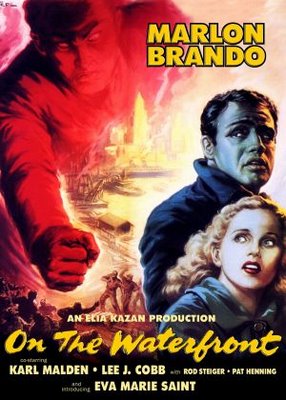
ON THE WATERFRONT
US, 1954, 105 minutes, Black and white,
Marlon Brando, Eva Marie Saint, Karl Malden, Lee J. Cobb, Rod Steiger.
Directed by Elia Kazan.
On the Waterfront had a great impact when it was first released. Although audiences are familiar with it now, it nevertheless is a strongly moving drama. Throughout the history of the movies, there has always been social concern. D. W. Griffith made it explicit 1n his early films. Charlie Chaplin's little man also made social comment. During the Depression and the war, moods were not always open to social films, although the Russians and Germans, for instance, were strong in this area.
Since On The Waterfront, many American films have been more courageous in exposing evils. This was not new for director Elia Kazan who won the Oscar for Best Director for this film. He had previously made A Tree Grows in Brooklyn, Gentlemen's Agreement, Boomerang, A Streetcar Named Desire and Viva Zapata (the last two with Marlon Brando). Marlon Brando shows how good an actor he is in his portrayal of the young pug on the docks who is forced to face up to some responsibility. He is matched by the supporting cast. Eva Marie Saint won the Oscar for Best Supporting Actress in this, her first film. Karl Malden is in control as Fr Barry, and apart from some over-tough mannerisms, makes the priest a convincing character. Malden had won an Oscar for Kazan's A Streetcar Named Desire. This is early Rod Steiger, but his improvised scene with Brando in the taxi is still famous.
Veteran photographer, Boris Kaufmann (The Pawnbroker, The Group etc.) captures the New York waterfront vividly and makes the film more convincing. The story is melodramatic and somewhat triumphant at the end (and this has caused some criticism) but it has a sense of reality and urgency that overcome these possible deficiencies. On the Waterfront should be seen by most audiences for its own sake and as a fine example of films in the 50's.
1. How did the murder of Joey Doyle and Terry Molloy's involvement in it set the mood for the whole film?
2. How was Terry a victim of his circumstances, looked after by Charlie and used by Johnny Friendly, a pug who knew nothing else but this kind of life and what he was told? How did Marlon Brando make Terry Molloy a living person?
3. All commentators note the use of the pigeons during the film and their symbolism. Comment on the role of the pigeons for Joey Doyle, for Terry, for Edie, for the boy Jimmy, the overtones of 'stool-pigeon'.
4. What is the symbolic meaning of the passing on of Joey Doyle's jacket?
5. What kind of woman was Edie? How had her convent education formed her? How was she changed by the events on the waterfront?
6. What kind of man was Johnny Friendly? Why had he sought power? How did he get it? How did he keep it? Did he have any concern for the social conditions on the wharves? How different was he from a gangster?
7. Comment on Friendly's 'court'. How did they keep in favour with him? Why was Charlie part of this 'court'?
8. Why did Fr Barry get involved in the waterfront problem? How sincere was he? What did he learn by the reaction to his call for a meeting?
9. What was the impact of Fr Barry's sermon in the ship's hold after the murder of Kayo Dugan? Did it make Christ 's passion and suffering relevant to the hard life of the waterfront? Did Karl Maiden act this sequence convincingly? Did Fr Barry come across as a good priest, in showing what a priest might do?
10. Why could Terry talk to Fr Barry? Was Fr Barry right in advising Terry to tell Edit the truth? What was the effect of filming this confrontation from a distance?
11. Why could Charlie not kill Terry? What was the impact of their final talk in the taxi?
12. Why did Terry talk to the law? Was this weakness or strength? Why did Friendly lose control in the courtroom?
13. What was the significance of the short sequence with the man up-stairs watching the court proceedings on T.V.?
14. What was the effect of the ignoring of Terry for work after the trial?
15. Why did Terry have to fight Johnny Friendly?
16. Why did Terry have to walk by himself to work? What was the significance of this? What kind of victory was it?
17. Was the ending too triumphant and moralising or was it necessary for the completion of this kind of film?
18. Was the film a drama or a melodrama? Was it a religious film? Why?